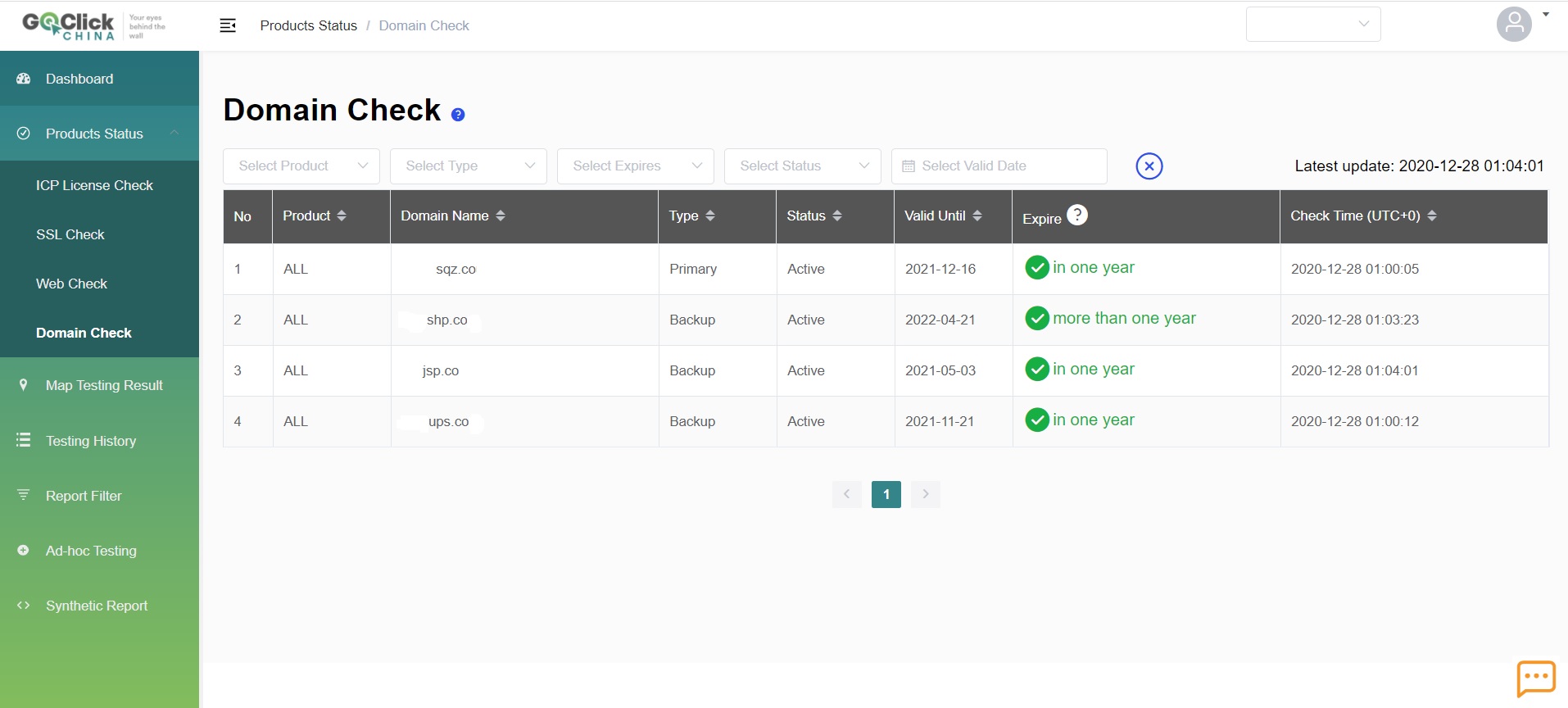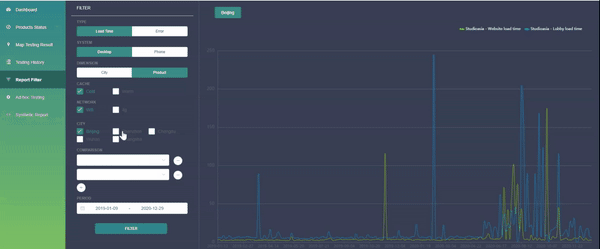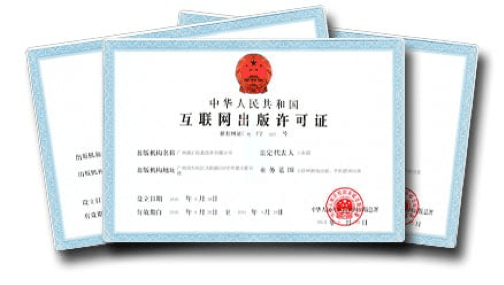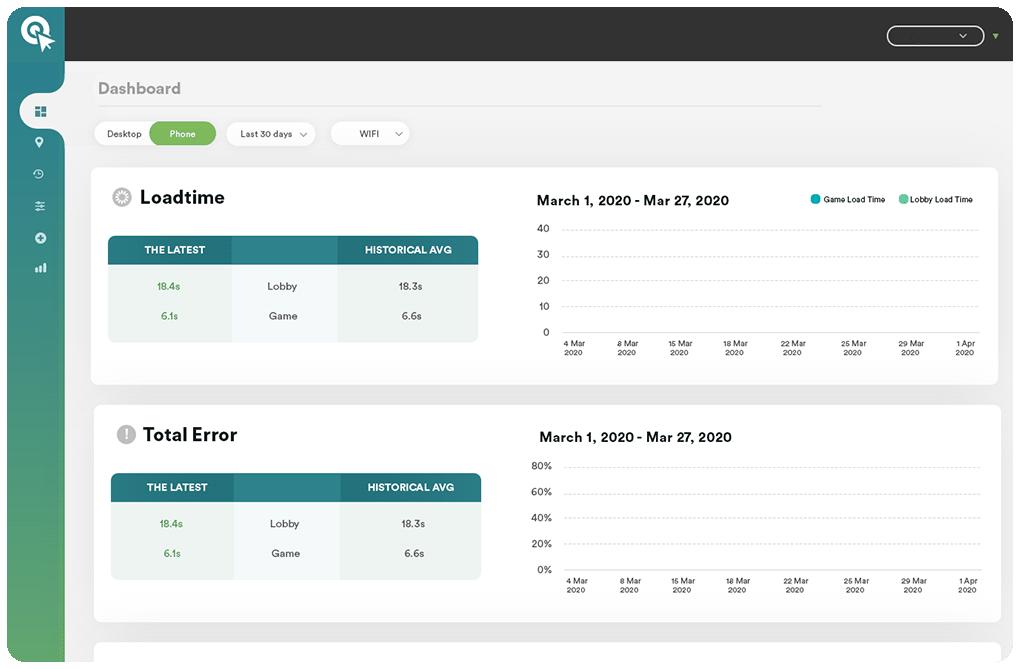The Great Firewall of China (GFoC), an umbrella term for all regulatory framework and technical mechanism, gives China a tight grip over its internet ecosystem. The GFoC has the authority and the right to block any content that is deemed inappropriate by the Chinese government.
Even if your website is hosted in China, it may be slow or not functional if it has been flagged by the Great Firewall. That's why optimizing your website or application for the China market is crucial for getting your business seen, and sometimes even this isn't enough.
Since the Great Firewall of China can block your whole online presence in an instant, regular monitoring and performance testing is an important part of your business strategy.
You may also be interested in: Everything you need to know about Chinese CDNs
Why is my website blocked in China?
The impact of increased cultural engagement and economic development with the rest of the world over the past 30 years has made a big impact on Chinese Society.
Being strict with their culture and change, they have maintained tight control over the information and exposure to these foreign ideas and topics.
Topics
- Exposing sensitive state information that may or may not result in defaming the government
- Inciting division within the country or insurrection against the government
- Promoting intolerance and discrimination against ethnic groups
- Promoting violence, obscenity, and related acts
- Resistance to government regulations and spreading rumors
- Content relating to gambling, porn, or unmoderated social media, video, multimedia
- Other content deemed inappropriate by the government
Many other platforms are blocked and replaced with their own versions to restrict Chinese citizens from falling into vices including gambling, porn, social media, and specific video hosting sites.
You might also be interested in: Is VPN even legal in China?
Make sure to check if any pages have these topics on any webpages of your website. If the Great Firewall of China spots or sees it, you could be marked and have your website considerably slowed down or even blocked. But the kicker here is "other content deemed inappropriate," whose definition is so fluid that you can never expect what may become a sensitive topic and make your site inaccessible as a result.
Keywords
The firewall scans URLs and block connections if it finds that your webpage contains sensitive keywords. This may include keywords contained in advertisements on your website or sensitive information that is generated by user comments.
Make sure if your webpage has a blog or a place where users can comment, you should have user generated content moderated to block sensitive keywords or rare keywords that may come up during sensitive events or specific times, when the government may put to use of the "other content" clause to block otherwise deemed inoffensive content.
You might also be interested in: How an ICP license can facilitate your business in China
You have to constantly check if your website has any of these sensitive topics or keywords because there will be no recourse if your website is blocked. Unlike Google, where you can talk to support to solve the misunderstanding or to take corrective measures; for the Great Firewall of China, once you are blacklisted, it is next to impossible to get unblocked. Certain websites do become accessible again after a period of time, usually after a certain event is over or after the system is flushed with the update of a keyword list though nobody has any insight into the timing or trigger of such occurrences.
This makes it very unpredictable for your website, making it a challenge for website operators as they have to constantly keep an eye on their sites. To make matters worse, the keywords may change from time to time, in particular during sensitive periods and special events. Webmasters may find their websites penalized before realizing that they are hit by a previously benign term or phrase. The GFoC never makes any announcements of what it does and explains what has happened. Frankly, there is no single entity that represents China's Great Firewall and has the power to interpret the laws, regulations and technical mechanism that constitutes the entire censorship system.
However, to first understand how you can prevent this from happening, you must know how the GFoC is able to block websites.
Domain

IP Blocking
IP Blocking or Packet Dropping Scheme is a very low cost and lightweight method. The Chinese authorities maintain a blacklist of IP addresses of restricted websites from foreign DNS servers.
With these restricted IPs, they use a process called null routing, where all packets that are sent to the specific IP address are rejected, blocking outbound traffic and permitting inbound traffic. This is enough to block a website because most Internet communication can only be established with two-way interaction.
You might also be interested in: How to launch a website in China as a foreign operator
However, there are many problems concerning IP Blocking.
- The list of restricted IP Addresses has to be kept up to date. However, this can be difficult if the blocked content provider wants to make it difficult for the ISP to block its website. Some tactics they could use would be rotating or changing IP addresses.
- China also runs the risk of accidentally leaking all these null routes to neighboring ISPs outside their country. This was seen with Pakistan with the null routes for Youtube, blocking Youtube's website for most of the world in 2008.
- China's Firewall system may also suffer from overblocking, a situation where many websites share an IP or address block with a banned website, causing these innocent websites as unintended collateral damage.
DNS Injection
The Great Firewall can monitor each DNS query from a DNS resolver around the world to ensure there is no sensitive query. It can inject or fake a DNS reply with an invalid IP address.
This is called DNS tampering, a way to falsify the response returned by the DNS server and lying about the associated IP address, any CNAMES related to the domain, authoritative servers for the domain, and the existence of the actual domain.
When DNS Injection is used with IP Blocking together, users who attempt to access these blocked sites such as Twitter are given a false response as the websites themselves are blocked at the domain level.
This was seen in 2002, when Google.cn was redirected to Baidu, China's search engine equivalent.
Apart from DNS spoofing, the Great Firewall routers are able to block unwanted communication by hijacking DNS queries and inject forged DNS replies. The injections of fake DNS A record responses will block sites successfully even when users are using third-party DNS resolves outside of the country since the Chinese Firewall will still be answering queries sent to these resolvers.
Although these techniques may be powerful, unintended consequences may also occur. As the Great Firewall doesn't distinguish between outgoing and incoming traffic, it may cause collateral damage that affects communication beyond the censored networks when outside DNS traffic goes through the censored link.
To ensure that the Chinese resolvers are not polluted, they use DNSSEC validation. Today, nearly all major domain name registrars and NS servers support DNSSEC as it adds two important features to the DNS Protocol.
- Data Integrity Protection - DIP allows the resolve to know that the data being sent has not been modified as it has been signed by the zone owner with their zone's private key
- Data Origin Authentication - DOA allows the resolver to cryptographically verify that the data actually comes from the zone from which the data should originate.
China's Great Firewall blocking can be intermittent, but is not always consistent. There is no complete way to block websites as IPs, Domains, and Servers are constantly conflicting or changing.
That's why knowing what gets blocked and avoiding pitfalls that foreign operators make is crucial in succeeding in China's digital world.
However If your site is blocked in China currently, ensure it's compliant with the rules listed above, your web host has an ICP license and each webpage is currently following the guidelines.
If you have a functional site, ensure on page optimization, hosting and CDN's are properly configured. This should make your site or application more competitive in the Chinese market.
That being said, the first step is to check if a website is blocked in China. You may do this on your own, or let the professionals help you out. GoClick China is a testing and monitoring service dedicated to websites facing mainland China. It offers synthetic, network, and real user tests. If you need help monitoring your web application from within mainland China or need help optimizing for this market, please contact us now for a free consultation.
My website works but it's slow

A website is a set of data that travels a long distance from hosting machines to a client at a very fast speed.
During this process, this data is routed through numerous hosting machines between the host and the client and is one of the major factors of latency when it comes to response time of a website.
The distance between the user and the location of the hosting machine influences the speed of your website, meaning if your hosting server is closer to China, it will be faster as long as you have the right networking connectivity.
That's why having Chinese hosting is essential as it automatically reduces the time that is spent on domain name lookups. This can save a few milliseconds which may provide a better experience for your customers while increasing your overall digital presence for search engines.
China often blocks website hosts located outside of mainland China from serving content that they deem is illegal or inappropriate according to their local regulations.
If you're using a web host outside of China's hosting service, most businesses are using shared hosting services. This means a service used by multiple websites with similar IP and DNS addresses used by different owners.
If one of these website's IP address is blocked, it will affect all the rest of the websites on the IP and DNS.
That's why getting a China CDN is essential and this begins with an ICP License.
An Internet Content Provider (ICP) License is a state-issued registration that legally allows China-based websites to operate in the country.
All sites that are hosted in China must apply and receive this license before they go live. By having an ICP license, you gain access to the Chinese Content Delivery Network (CDN) and have better performing websites.
How to get an ICP license

To be eligible for an ICP license, you may need these forms of identification:
- Chinese Nationals that have a state-issued ID
- Foreign passport holders
- Chinese Owned, Joint Venture, or Wholly Foreign-Owned business can apply for Business ICP License.
Here are the steps in acquiring an ICP License:
- Register a Domain and Purchase Hosting in China
Go to a Chinese provider such as Aliyun and register a domain and purchase hosting. You'll receive a Bei'an service number that attaches to your server and domain. This is a special identification number used for your ICP application filing.
- Register for Aliyun ICP Management System
Login into Aliyun's System and fill out your ICP application. You'll need the following information:
- Bei'an service number
- Chinese landline number
- Chinese mobile phone number
- Domain name
- Details about your website, such as the type of content and the language it will be in
- Details about your business
- Identification number
- Type of identification you will provide
- The province and district you are registering from
- The type of ICP you are filing for
- Passport photo
- Submit Documents for Approval
Submit all the documents and a recent picture of yourself to Aliyun. Then you'll wait until the official approval to the MIIT. You cannot use your hosting account until you get your ICP License. This may take three to six weeks.
To make the most of the ICP on your website, many software optimizations and substitutions are required. As there are millions of websites that already have ICP licenses, hiring an engineer or team with experience delivering into the mainland Chinese market is crucial in making an online presence in China's Digital Market.
Click here to find out how you can achieve this with your website.
Chinese website hurdles
Once you've completed the application for ICP, constant monitoring of your website or app for performance and uptime is essential.
As China is a big market with expansive land mass spanning five time zones and ranging from warm tropical region to the frigid zone, it's important to monitor your performance across different regions. Since website hosting servers are located in specific areas, places that are further away may experience more latency than another region.
If you're a company that has an international audience, monitoring your network latency is also important. Making sure that your website load speed is optimized for all countries is essential for search engine performances such as Google and Bing.
This can be done by performing manual and real user testing that ensures your website speed is fast, for a good user experience as well as for SEO purposes on Baidu and other Chinese search engines.
Performance testing is a great way to determine which webpage is performing better and how you are performing in relation to your competitors.
These are the two different testings that you can pick from:
Real User Monitoring (RUM)

RUM measures the response times and performance using actual devices and browsers by a real person. The results are shown through the user end, providing you the analytics of bounce rates, page load speeds, and other performance metrics.
Synthetic Monitoring (STM)
STM simulates and mimics real user interactions and behaviors to create an educated performance assessment. This can be run periodically from different locations to get an overview of what your audience experiences when visiting your site.
GoClick China provides all of these testing solutions for the Chinese website market. With hands-on testing from real people on real devices, throughout the country, it provides you a complete detailed overview of all your audience throughout China.
Providing you with comprehensive analytics, benchmarks, and insights will give you an unfair advantage over your competition. You'll gain complete transparency of what areas of your website needs to improve and optimize so your company can be seen first in front of your target audience. It has never been easier to enter the Chinese market.
Conclusion
If your site is blocked in China, ensure it's compliant with the rules listed above. There is no known process to unblock a site, you may have to host the site on a new URL. So the best protection is not to get blocked in the first place.
If you have a functional site, ensure that you have an ICP license and follow the guidelines; also ensure that on-page optimization, hosting and CDN's are properly configured. This should make your site or application more competitive in the Chinese market.
GoClick China is a testing and monitoring service dedicated to mainland China. It offers synthetic, network, and real user tests. If you would like help monitoring your application from within mainland China or need help optimizing for this market, please contact us now for a free consultation.
